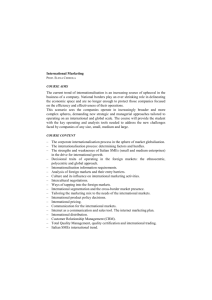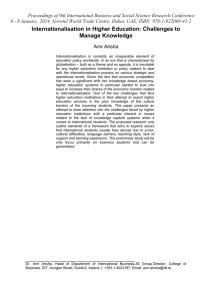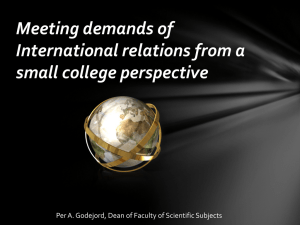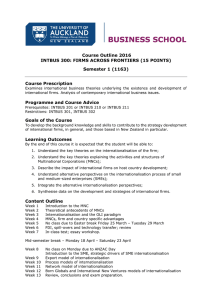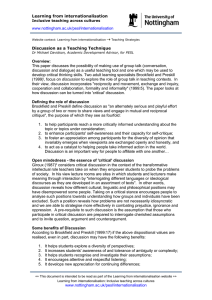THINK OUT OF THE BOX
advertisement
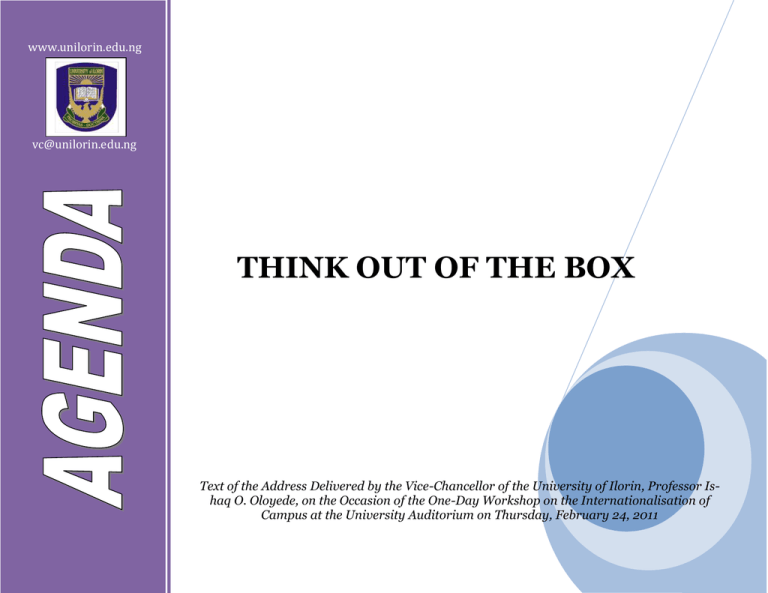
www.unilorin.edu.ng vc@unilorin.edu.ng THINK OUT OF THE BOX Text of the Address Delivered by the Vice-Chancellor of the University of Ilorin, Professor Ishaq O. Oloyede, on the Occasion of the One-Day Workshop on the Internationalisation of Campus at the University Auditorium on Thursday, February 24, 2011 THINK OUT OF THE BOX I feel enamoured to welcome you all to this special occasion. I consider it special because it is an uncommon programme that is intended to showcase an irresistible trend that many people, especially in our part of the world, are still yet to reckon with. The idea of internationalisation is no doubt a reality in a world that has shrunk considerably such that geographical barriers are already inconsequential in human communication and interaction. I want to commend the Centre for International Education for living up to its billing by sensitising the University community through this workshop on the concept of internationalisation. I congratulate the Centre as I fervently believe that all participants will benefit one way or the other at the end of it. The array of speakers lined up to address this workshop assures me that participants will gain from it and we shall all appreciate the essence of thinking internationally, not just locally. Ladies and gentlemen, there is so much violence in the world today, Nigeria inclusive, as a result of the prevalent dichotomy between “self” and the “other”. The pages of history are red with the atrocities that this unhealthy dualism, self versus the other, has caused human race through such petrifying anachronisms as racism, apartheid, Nazism, Fascism and such other intellectual rubbish that have tended to make self alienate and subjugate the other. Whereas, the truth of the matter is that all humanity is one as we all derive from one source. In other words, we are all from Adam, our collective progenitor. One important institution that promotes the universality of mankind is the university. The university conceptually is supposed to be a centre in which the universe, as diverse and varied it is, resides within its city, something like a universal city where everybody is represented. This, I believe, is why a university is a melting point of ideas, a confluence of people, the centre point of disciplines and other resources that ignite value. A typical university in the true sense of the word is the University of Ilorin, the international centre of excellence. However, as the case is in many sub-saharan, Latin American and Asian universities, academic communities that are supposed to be universal are now local in content and shape. There are some universities where the 1 staff and students speak the same language and are made up of the same type of people. This is a travesty of what a university stands for: pluralism. As the University of Ilorin pursues the internationalisation of its staff and students such that many nonNigerians constitute members of its academic community as students and staff, it is crucial to emphasise that internationalisation is not limited to the physical. There are mental, psychological or attitudinal dimensions of internationalisation that are critical to the success of individuals and societies. In other words, we need to think, feel and act internationally and avoid situations that do not get one out of the box of one’s locality.. For instance, whoever thinks that the violence and disasters in some parts of the world do not concern him is living in the past. It is for this reason that the unfolding scenarios in many parts of the Arab world and other places are subjects of international discourse and global dimension. As a matter of fact, if we think out of the box and reach out to others, we will further be enriched. But if we lock our hearts against the world, brand fellow human beings “others” and shut our eyes against fellow human beings, we succeed in achieving self-abnegation. The other is part of the self and no self can be divorced from the other. The challenge before us is to think out of the box, reach out to others, learn and develop. To think out of the box in this context is to get out of the cage of self. Nothing best illustrates the point I am making on the significance of reaching out than the story of the three Hindu brothers. The three brothers inherited 17 cows with the instruction that the sharing formula is that the first of them should have half of the 17, the second should have a third while the last should have one ninth (that is, ⅟2 , ⅟ 3 and ⅟9 respectively). This posed a very great challenge since no one could get his rightful portion exactly without fractions and the killing of a cow is forbidden in their culture. Since ⅟2 of 17 is 8⅟2 and ⅟3 of 17 is slightly more than 5⅟2 though less than 6 while ⅟9 is not up to 2, the dilemma was how to distribute the cows according to the sharing formula. How would this dilemma be solved? They only needed to think. The three brothers reached out to a man who made them realise that they had no problem and all they needed was to borrow a cow which they would return immediately. Now, when they got the extra cow which made the cows 18, everyone had his share fully and they then returned the extra the cow to the owner. That is how they 2 did it: ⅟2 of 18, which is 9 belonged to the first person; ⅟ 3 of 18, which is 6 was given to the second person; and ⅟9 of 18 which is 2 got to the third person. As 9 ₊ 6 ₊ 2 ₌ 17, the remaining one cow was returned to the owner and nothing was lost. Essentially, ladies and gentlemen, the solution to most of our problems lies in externalising them and benefitting from the person next door. That is the gain of internationalisation and it is high time we started thinking and acting internationally. The internationalisation of the campus is ultimately aimed at making the University rightfully universal and its members global citizens. All of us regardless of where we were accidentally born in (since no one had a choice in determining his/her ethnicity or nationality) are one humanity. We are all one and we are one world. I wish you fruitful workshop sessions and I thank you for your attention. 3
